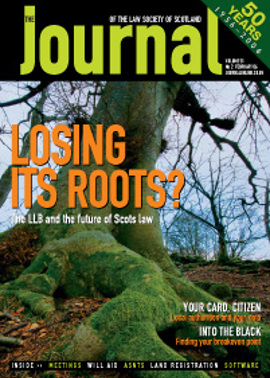A welcome addition

The new Additional Support Needs Tribunals introduced by the Education (Additional Support for Learning) (Scotland) Act 2004 (“the Act”) are now fully established and ready to hear their first cases. The tribunal panel will comprise three individuals, one being the convener who will be legally qualified, and the other two members being individuals who have some experience or knowledge relative to working with children or young people with “additional support needs”.
The tribunals provide a forum where the specific needs of a child or young person with “additional support needs” can be addressed independently of the education authorities. In terms of the Act a child or young person has such needs “where, for whatever reason, the child or young person is, or is likely to be, unable without the provision of additional support to benefit from school education provided or to be provided” for him/her.
The existence of the tribunal system ensures that parents of such children or young people, or indeed the young people themselves (if they have capacity) can be proactive in appealing against decisions taken by education authorities relative to catering, or not adequately catering, for the child or young person’s often very individualised needs, to ensure that they obtain the maximum benefit from their education.
The CSP and its role
The Act introduced “co-ordinated support plans” (CSPs), which replace the old records of needs, and are designed to ensure that the specific needs of children and young people with complex needs are identified. The CSP will then detail the educational objectives to be achieved, taking account of additional support needs, how these needs will be catered for to achieve the objectives, and how the required support will be provided. The actual provision of support will require to be quantified and it is anticipated that it may take some time for those involved in preparing CSPs to come to terms with ensuring that sufficient detail and quantification exists to prevent appeals to the tribunals being made.
Parents now have a right under the Act to have their views taken into account and noted in the CSP. In addition the views of the child or young person will be taken into account and noted in the CSP.
Referrals to the tribunals will be purely in relation to CSPs, whether that be in cases where for example, there is a dispute as to the content of a CSP, a dispute as to whether, following a review of a CSP, the child or young person still requires a CSP or not, a dispute where the parent feels that their child should have a CSP and has not been provided with one, or indeed the converse. Appeals can also be brought where, after having established that a CSP is needed, there is failure on the part of the education authority to prepare it timeously. The ability to refer a case to the tribunals in such situations is welcomed by parents who may often have, up until now, felt powerless relative to ensuring that their child’s needs are adequately met within the education system.
Lawyers at arms’ length
For some, the prospect of presenting a case at a tribunal is extremely daunting, especially when they are emotionally involved in the case. The intention however is that the tribunal process will be informal and that parents of children or young people with additional support needs, or indeed the young person themselves, should be able to present cases without legal representation. To encourage informality, it is intended that the tribunal hearings should not last for more than half a day and that there should be a maximum of two witnesses called on behalf of the child or young person and the same on behalf of the education authority.
Some however anticipate that in complex cases where, for example, there are a number of expert reports and bundles of documents to be presented, or in cases where the parent or young person is simply not confident enough to present their case, legal representation will be required.
In practical terms, a referral to the tribunals must be made within two months starting on the date when the authority gives its final written decision. Once a referral has been made to the Tribunals Office, it will be determined whether the tribunal has jurisdiction to deal with the matter. On a referral being accepted and registered, a copy of the referral document will be sent to the education authority and each party then has 30 working days to make a case statement and provide any further evidence. There may be an extension of this time limit on application in certain circumstances.
Legal aid advice and assistance will be available for preparing cases but not for advocacy at the tribunals. Organisations such as the National Autistic Society offer services where parents and young people can obtain assistance with such matters if so required, and Harper Macleod LLP are offering pro bono services to that Society, relative to preparation of cases and advocacy in appropriate cases.
It is expected that in some cases the decision of the tribunal will be given at the conclusion of the hearing, and in all cases that a written decision will be given within 10 working days after the conclusion of the hearing. There is provision for appeal to the Court of Session against the tribunal’s decision on limited grounds. As with other tribunals, it is not anticipated that awards of expenses will be made against either party. One anticipated problem relative to costs is that the costs of obtaining expert reports, for example, may well act as a barrier to referrals to the tribunals for parents, and in such cases mediation might be an alternative avenue to consider.
Other avenues open
The Act makes provision for such mediation and also in some circumstances for alternative dispute resolution. Each education authority must, in terms of the Act, have in place arrangements for mediation where an independent mediator will become involved to try to resolve disputes between parents and the education authority in cases where a child or young person has additional support needs. A referral to mediation is voluntary and one cannot be criticised at tribunal for having not entered into mediation or having entered into it with no resolution being reached. Whilst the availability of mediation is to be welcomed, one can foresee there being many cases where, due to, amongst other things, the emotional involvement that parents have, it is simply not a viable option. Mediation can still be used when a referral has been made and it is open to parents or young people to withdraw a referral.
As referrals to the tribunal currently can only be in relation to matters involving CSPs, the Act also provides for independent adjudication in cases where there is no CSP or where the dispute is not over whether a child should have a plan or not but relates to additional support needs matters such as, for example, where the education authority refuses to assess a child on a parent’s request to ascertain whether or not there are additional support needs.
It is expected that lessons can be learned from the experience of the Special Educational Needs Tribunals system in England and that with the hearing of cases at tribunals in Scotland, there will be increased awareness as to the requirement to meet the needs of the many vulnerable children and young people within the education system.
Stephanie Carr is a partner in the Litigation and Dispute Resolution Practice Group at Harper Macleod LLP
t: 0141 227 9353
In this issue
- Legal aid in children's hearing referrals
- Still waters run deep
- Catch-up or patch-up?
- Legal science or law-lite?
- Heads above water
- Your name on file
- A welcome addition
- Another ***** meeting?
- A neglected asset
- Planning a year of action
- The Pagan mission
- A good case to read
- Jurisdiction: dispelling the myth
- That special something
- The art of cashing in
- Scottish Solicitors' Discipline Tribunal
- Website reviews
- Book reviews
- In on the Act
- Keeper's corner






